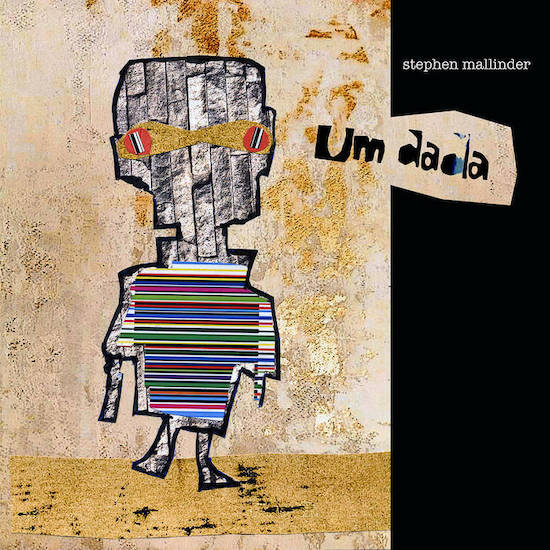On looking at an album with a title such as Um Dada, with a cover depicting the human as a disjointed cut-up collage, I may be forgiven for letting out a heavy sigh at the thought of being subjected to an overly determined album-as-concept, with music that is going to be a slog through well-worn historical avant garde tropes. But from the very first track of Um Dada, Cabaret Voltaire founder Stephen Mallinder’s first solo album in thirty-five years, you have a record full of tough yet infectious machine grooves and impish vocal lines that reminds us that one of the fundamental aspects of the Dadaist avant garde was not to be overtly serious and earnest, but to be playful, irreverent, to find one’s rhythm against the incessant grind of the world and ride it for all its worth.
Of course, it may be his first solo album for thirty-five years, but in that time, Mallinder has been anything but lazy. Alongside his work with the Cabaret Voltaire, he’s been involved in a myriad of music and art projects, such as Wrangler, Creep Show, Ku-Ling Bros., Hey Rube, and Cobby & Mallinder, each of which explore differing aspects of dance music’s industrial and experimental continuum from the EBM and electro foundations of the 80s to the present day.
At the heart of his solo work, and numerous side projects is a preoccupation with rhythms, and how they make the body move, both from the music and in the world outside. Even as far back as his Temperature Drop EP from 1981 and 1982’s Pow-Wow, with their blend of metronomic assembly-line beats and grungy percussiveness, you can hear the fascination in Mallinder’s music for the beat and its penetration into our lives. The pursuit of this fascination has led Mallinder to pursue an academic and journalistic career, writing a PhD about how rhythm in culture has changed the view of the self and how rhythm allows us to find ways to navigate and make sense of a world of digital and global capital.
Um Dada definitely links into that continuum of unconventional dance grooves. Casting a backwards glance towards that fleeting sweet spot between the skeletal funk of Chicago house, NYC electro, and the industrial dregs of UK post-punk that marked both Mallinder’s Pow Wow and Cabaret Voltaire’s Mid-80s Virgin era, this album, with its tight automated beats and grooves, could easily have been made in 1985 instead of 2019.
But despite this temptation of wallowing in what he terms a “rosy retrospection” of “false nostalgia about the analogue past,” easily brought up at the click of a mouse, Mallinder seeks to remind the listener of the tactile, hard edged nature of those times. Opening tracks such as ‘Working (You Are)’, ‘Colour’, and ‘Um Dada’ link up the old idea of dada sound poetry, with its unconventional structures and nonsensical words, and the vocal tape experiments of the early Cabs era, as Mallinder twists, chops and screws his voice, uttering the song’s titles in multiple ways, providing a slippery, mischievous energy against an austere backdrop of assembly labour.
The idea of digital work, of being a cog in a networked system is played with in a tongue-in-cheek manner. The<a href=” https://www.youtube.com/watch?v=uyeYjwrNK4g” target=”out”>video to ‘Working (You Are)’ consists of just Mallinder’s head and the text of the song title made up to resemble a PC screensaver, juxtaposing the energy of the song against the banality of actual work-time where, despite the illusion of speed and productivity, not much actually happens.
Despite Mallinder’s acerbic, queasy delivery in places, Um Dada is by no means a dry or dour album by any means. ‘It’s Not Me’ and ‘Prefix, Repeat, Rewind’ have a restless quality, with jerking synths and jittery synths that are inherent in the social alienation of Mallinder’s vocals and lyrics, while the low slung, prowling bass-beat combo of ‘Satellite’ works really well with Mallinder’s processed voice, containing an eerie level of machinic vulnerability and emotion.
Um Dada sees the wealth of experience and the weight of history that Mallinder can summon to hand. And while there are no new artistic or aesthetic territories being staked out in his return to solo production, the album, with its mix of past structures and contemporary vision, sits at a weird juncture in the dance music terrain right now, being too abrasive and knowing for the lo-fi tech-house crowd, but too funky and colourful for the grimdark industrial warehouse techno scene. Instead Um Dada just happily exists on its own whimsical terms, happy to play and dance to its own machines and hardware.


